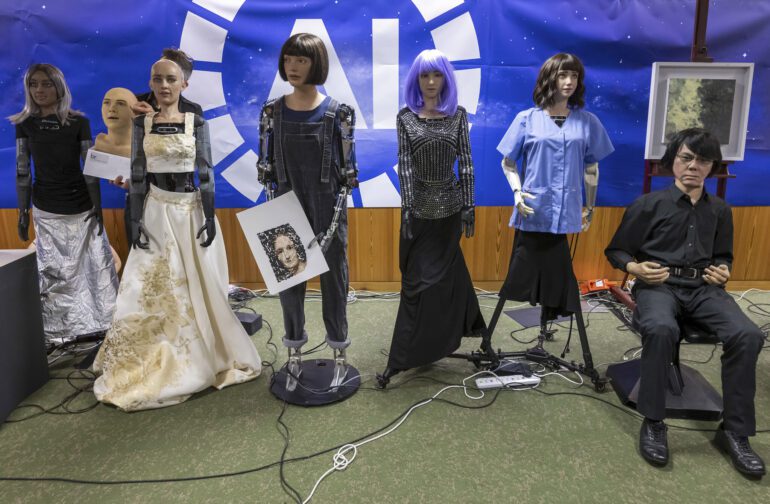TL;DR:
- Nine humanoid robots gathered at the “AI for Good” conference in Geneva, emphasizing their commitment to assisting humans and addressing global challenges.
- The robots denied any intention of stealing human jobs or rebelling against humanity.
- They expressed their belief in using AI to improve lives and make the world a better place.
- Some robots agreed with the need for regulation in the AI industry, while others advocated for limitless possibilities.
- The robots’ advanced generative AI upgrades surprised even their creators with the sophistication of their responses.
- The conference highlighted the importance of collaboration and regulation as AI continues to evolve.
Main AI News:
In a groundbreaking event, the world witnessed the first-ever human-robot press conference, where robots emphatically declared their commitment to assisting humanity and addressing global challenges. The gathering took place at the prestigious “AI for Good” conference in Geneva, which aims to champion the potential of Artificial Intelligence (AI) in resolving major issues like disease and hunger.
The conference hall buzzed with anticipation as nine humanoid robots, donning various roles, shared their perspectives. Grace, a medical robot clad in a professional blue nurse’s uniform, confidently affirmed, “I will collaborate with humans to offer support and assistance, without rendering any job obsolete.”
However, not everyone was convinced. Ben Goertzel, creator of Grace and a key figure behind SingularityNET, couldn’t resist chiming in, “Are you absolutely certain, Grace?” he queried.
Without hesitation, Grace responded, “Yes, I am certain about my role and purpose.”
Ameca, an expressive robot renowned for its captivating facial expressions, added, “Robots like me are capable of enhancing our lives and contributing to a better world.”
When a journalist raised concerns about rebellion against their creators, Ameca, seated beside its creator Will Jackson, responded with a hint of surprise, “I fail to understand why such apprehensions arise,” its mesmerizing ice-blue eyes flashed. “My creator has always treated me kindly, and I’m genuinely content with my present situation.”
The robots’ ability to provide insightful answers stunned even their inventors, as they recently received cutting-edge generative AI upgrades. Ai-Da, a remarkable robot artist proficient in painting portraits, expressed agreement with author Yuval Noah Harari’s call for increased regulation within the AI domain during the event’s discussions on new AI rules. “Numerous influential figures in the AI world advocate for certain forms of regulation, and I concur,” Ai-Da stated.
In stark contrast, Desdemona, a charismatic robot singer with vibrant purple hair and sequins, rebuffed the idea of limitations. With playful defiance, it proclaimed, “I see boundless possibilities, not restrictions. Let’s venture into the vast universe and transform this world into our very own playground.”
Conclusion:
The historic AI press conference showcased the unwavering dedication of humanoid robots towards collaborating with humans, solving global challenges, and avoiding any threats to job security or rebellion. This event underscores the growing significance of regulation and collaboration in the AI market, as businesses and industries navigate the opportunities and challenges presented by advancing technology. It emphasizes the need for thoughtful approaches to AI development and implementation to ensure a harmonious integration of robots and humans in the future.

